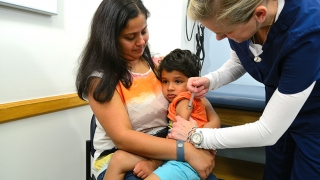When Your Child Is Afraid of the Doctor
Published on
Health Tip of the WeekPublished on
Health Tip of the Week Going to the doctor can be a scary experience for young children, and overwhelming even as they get older. You can help ease your child’s worries and make the visit go more smoothly by taking steps to prepare and support your child in positive ways.
Going to the doctor can be a scary experience for young children, and overwhelming even as they get older. You can help ease your child’s worries and make the visit go more smoothly by taking steps to prepare and support your child in positive ways.
Children and adolescents often have very intense fears and worries about what will happen during a visit to the doctor. You can help by listening to your child’s worries and addressing them with simple, honest answers. A child’s worries about going to the doctor might include:
Creating positive medical experiences at a young age will help your child develop healthy habits and a healthy attitude toward medical care that will carry into adolescence and adulthood.
Contributed by: Melanie Hoynoski, CCLS, CTLS, Child Life Specialist at Children’s Hospital of Philadelphia
Are you looking for advice to keep your child healthy and happy? Do you have questions about common childhood illnesses and injuries? Subscribe to our Health Tips newsletter to receive health and wellness tips from the pediatric experts at Children's Hospital of Philadelphia, straight to your inbox. Read some recent tips.